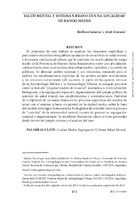Salud mental y sistema urbano en una localidad de rango medio
Abstract
El propósito de este trabajo es analizar las relaciones específicas y particulares entre el sistema público satisfactor de un servicio de salud mental y el sistema institucional urbano que lo contiene, en una localidad de rango medio de la Provincia de Buenos Aires, básicamente como una articulación contradictoria entre la estructura de la urbanización capitalista y los servicios públicos. Se abordan ambos sistemas y sus relaciones, tomando para el análisis las manifestaciones explícitas de los actores sociales involucrados y los procesos estructurales sub-yacentes. A partir de los aportes teóricos de la Antropología Médica y la Antropología Urbana, se indagan procesos como la llamada “psiquiatrización de lo social”, asociada a la medicalización biologicista, y la segregación espacial y organizacional del aparato público de atención de salud mental, sus encubrimientos y contradicciones. Partimos de la hipótesis de un isomorfismo en los procesos específicos del sistema de salud con el sistema urbano, en general en la ciudad media, sobre la base del modelo ideológico homeostático biologicista de concebir tanto el proceso de “curación” de la enfermedad mental, cuanto de generar su segregación espacial y organizacional. Se establecen finalmente claves críticas generadas desde dentro del propio sistema y el análisis del caso. The intention of this work is to analyze the specific and particular relations between the public system of a mental health service and the institutional urban system that contains it, in an average range town of Buenos Aires province, as a contradictory joint between the structure of the capitalist urbanization and the public services. Both systems and its relations are analytically approached through the explicit manifestations of the social actors involved and the structural underlying processes. From the theoretical contributions of Medical Anthropology and Urban Anthropology, processes such as the “psychiatrization of social matters”, are investigated as being associated with biological medicalization, and the spatial and organizational segregation of the public device of attention of mental health. Its concealments and contradictions result in agreement with the hypothesis of an isomorphism of the specific processes of the health system and the urban system in the intermediate city on the base of the homeostatic biologistic ideological model that conceives both the process of “healing” mental illness and the generation of its spatial and organizational segregation. Finally, critical clues are generated and established from inside the system itself and the analysis of the case.
Collections
- Revista Avá [359]




